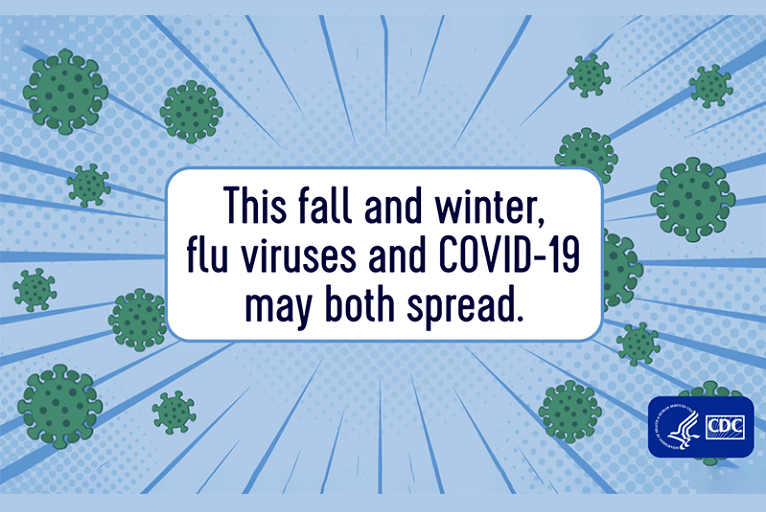

This influenza (flu) season, more than ever, it is critical that everyone age 6 months and older gets a flu vaccine to help reduce the spread of flu and associated complications that can lead to hospitalization and death. This will not only reduce illnesses and save lives but can lessen the burden on healthcare systems and help preserve medical resources for the care of COVID-19 patients.
Individuals With Chronic Health Conditions Are At Increased Risk For Severe Flu Illness
Most people who get sick with flu have mild illness and will recover in less than two weeks. However, some people, including those with chronic health conditions, are more likely to develop serious flu-related complications, even if those conditions are well managed. During most flu seasons, 90 percent of adults who are hospitalized with flu have an underlying medical condition. Among the most common during the 2019-2020 season were cardiovascular disease (47 percent), metabolic disorders including diabetes (43 percent), and obesity (41 percent).
There are many people who live with chronic health conditions—according to a Centers for Disease Control and Prevention (CDC) study, almost half (45.5 percent) of US adults have at least one underlying condition, including:
- diabetes (11 percent);
- asthma (9 percent); or
- cardiovascular disease (9 percent).
These, among other chronic conditions, can put individuals at increased risk for serious flu-related outcomes. While nearly half of US adults live with a chronic health condition, only 51.4 percent of adults with high-risk conditions reported getting a flu vaccine last season.
When looking at the data by race and ethnicity, the picture is even more concerning. Certain racial and ethnic groups are more likely to suffer from underlying conditions, including obesity, diabetes, asthma, and cardiovascular disease. And the data show that they are disproportionately impacted by severe flu illness as a result. A CDC analysis of flu seasons from 2009-2010 to 2018-2019 shows that non-Hispanic Black, non-Hispanic American Indian or Alaska Native, and Hispanic or Latino persons are at increased risk of being hospitalized with flu.
These disparities underscore the importance of flu vaccination in communities of color, however, the CDC report summarizing flu vaccine uptake last season (2019-2020) showed disparities in vaccine uptake among racial and ethnic groups. Among US adults, flu vaccination coverage was 38 percent among Hispanic or Latino persons, 41 percent among non-Hispanic Black persons, and 42 percent among American Indian or Alaska Native persons, compared to 53 percent among non-Hispanic white persons.
Annual Flu Vaccination Is The Best Way To Protect Against Flu
CDC recommends that everyone age 6 months and older get a flu vaccine each year as the best way to protect against flu and related serious complications. Flu vaccination is more important than ever this flu season. The more people vaccinated against flu, the more people protected from flu—and the less likely that flu can spread, keeping people out of healthcare offices and hospitals, preserving limited medical resources to care for COVID-19 patients.
Healthcare Professionals: There Is Still Time To Make A Strong Flu Vaccine Recommendation
Your recommendation is critical and can have an impact on whether your patients get a flu vaccine. While most adults believe that getting a flu vaccine is important, sometimes they need a reminder from you to get vaccinated. CDC suggests using the SHARE Method to make a strong vaccine recommendation and provide important information to help patients make informed decisions about vaccinations. In honor of National Influenza Vaccination Week (NIVW), insist on flu vaccine for your patients.
As long as flu viruses are circulating, vaccination should continue throughout flu season …
more recommended stories
 Safer Allogeneic Stem Cell Transplants with Treg Therapy
Safer Allogeneic Stem Cell Transplants with Treg TherapyA new preclinical study from the.
 Autoimmune Disorders: ADA2 as a Therapeutic Target
Autoimmune Disorders: ADA2 as a Therapeutic TargetAdenosine deaminase 2 (ADA2) has emerged.
 Kaempferol: A Breakthrough in Allergy Management
Kaempferol: A Breakthrough in Allergy ManagementKaempferol, a dietary flavonoid found in.
 Early Milk Cereal Drinks May Spur Infant Weight Gain
Early Milk Cereal Drinks May Spur Infant Weight GainNew research published in Acta Paediatrica.
 TaVNS: A Breakthrough for Chronic Insomnia Treatment
TaVNS: A Breakthrough for Chronic Insomnia TreatmentA recent study conducted by the.
 First-of-Its-Kind Gene-Edited Pig Kidney: Towana’s New Life
First-of-Its-Kind Gene-Edited Pig Kidney: Towana’s New LifeSurgeons at NYU Langone Health have.
 Just-in-Time Training Improves Success & Patient Safety
Just-in-Time Training Improves Success & Patient SafetyA study published in The BMJ.
 ChatGPT Excels in Medical Summaries, Lacks Field-Specific Relevance
ChatGPT Excels in Medical Summaries, Lacks Field-Specific RelevanceIn a recent study published in.
 Study finds automated decision minimizes high-risk medicine combinations in ICU patients
Study finds automated decision minimizes high-risk medicine combinations in ICU patientsA multicenter study coordinated by Amsterdam.
 Study Discovers Connection Between Omicron Infection and Brain Structure Changes in Men
Study Discovers Connection Between Omicron Infection and Brain Structure Changes in MenA recent study in the JAMA.

Leave a Comment